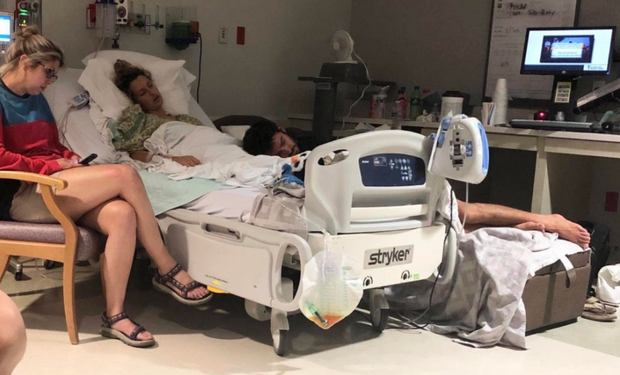Just a couple of days into her program, Perea woke with a “critical stomachache” that she first mistook for meals poisoning, however when she used the lavatory she handed “frothy blood” that made her determine to go to the emergency room at a hospital she didn’t identify due to pending litigation. Perea was instructed {that a} CT scan taken by docs confirmed no indicators of an issue.
When her signs continued, she went to a different hospital the place she was noticed once more, however nonetheless not recognized with something. Doctors seemed on the identical CT scan, and mentioned one thing like a clot was unlikely due to her age and relative well being. On the third day of her signs, Perea started vomiting blood, and once more returned to the emergency room as her signs intensified.
An exploratory surgical procedure revealed that there had been a blood clot in one of many vessels that carries blood from the small intestines, a situation referred to as mesenteric ischemia. Surgeons tried to salvage the organs, however discovered an excessive amount of necrotic tissue.
“They simply noticed that every part was utterly black, necrotic, useless,” Perea instructed CBS News. “They (instructed my boyfriend) ‘There’s no manner she’s going to outlive this, you should name her mother and father. Get anybody right here who must be right here, as a result of she in all probability has 24 hours to reside.'”
Danielle Perea
Perea went into hospice care, however exceeded expectations, sustaining “sturdy vitals” for over every week. During that point, her mom and boyfriend looked for a miracle. They discovered about Cleveland Clinic’s intestinal transplant program, the most important within the nation, and the top of this system, Dr. Kareem Abu-Elmagd, agreed to take Perea’s case.
What is an intestinal transplant, and why are they so uncommon?
An intestinal transplant replaces the small gut with a brand new organ. Just 95 have been carried out within the United States final yr, based on Dr. Masato Fujiki, director of intestinal transplantation at Cleveland Clinic and one of many docs who handled Perea. Eighteen of these have been carried out on the Cleveland Clinic, making it the most important intestinal transplant program within the nation. During the identical time interval, there have been over 10,000 liver transplants and greater than 4,000 heart transplants.
There are about 15,000 eligible organ donors every year, and there are usually not many sufferers eligible for an intestinal transplant. This permits docs to “be very selective, to get the most effective organ,” Fujiki mentioned. Ideal intestinal donors are people who find themselves below the age of fifty and in good well being, and who’ve steady blood stress.
While it is not notably tough to discover a appropriate organ, intestinal transplants didn’t have a excessive success price till lately, contributing to their rarity, Fujiki mentioned. Intestines are a “tough” organ to observe, he mentioned, and intestinal transplants have the very best rejection price of any form of organ transplant.
The one-year graft survival price for a affected person who has an intestinal transplant was as much as 82% in 2022, from a price of 76.2% in 2018, based on nationwide information. That’s nonetheless beneath the graft survival price for extra widespread procedures like liver transplants, which have a price of 85 to 90%, Fujiki mentioned.
An prolonged street to restoration
Once Perea’s household discovered concerning the intestinal transplant program and her case had been accepted at Cleveland Clinic, she was dropped at the Ohio hospital. Her small bowel was nearly fully resected. Her situation was stabilized, and after a number of different procedures, she was formally added to the transplant checklist within the spring of 2019.
Before the transplant, Perea spent a yr and a half dwelling on IV-administered vitamin as a result of with out the intestines, she could not eat usually. The period of time she spent being supported by machines meant Perea needed to have one other surgical procedure to restore injury to her trachea earlier than she might obtain the transplant, extending the period of time she needed to wait. The coronavirus pandemic additionally sophisticated the method, forcing her to move on an organ in April 2020.
Danielle Perea
Finally, in June 2020, Perea acquired the decision she had been ready for.
“They have been similar to, ‘You have to get to the clinic instantly.’ It wasn’t an choice,” Perea mentioned.
The surgical procedure took 10 hours, and even as soon as the brand new organ was in place, Perea continued to spend time within the hospital, being readmitted for frequent fevers. In January 2021, she had one other process to restore her stomach wall and reverse her ileostomy, an incision made through the surgical procedure.
Now, 4 years after the operation, she instructed CBS News that she will be able to reside comparatively usually, although she does take “about 40 drugs a day.” There is the likelihood she would possibly want a kidney transplant sooner or later, due to the affect of anti-rejection drugs on that organ, and he or she has annual appointments on the Cleveland Clinic to observe the transplant, however every part has been “tremendous regular” thus far.
“I haven’t got any restrictions. My incisions healed effectively. I acquired married in November,” Perea mentioned. “We purchased a home. It’s simply all going effectively.”
At Cleveland Clinic, she mentioned, “they’re like, ‘Just hold dwelling your life. There’s nothing stopping you.'”
Danielle Perea











































